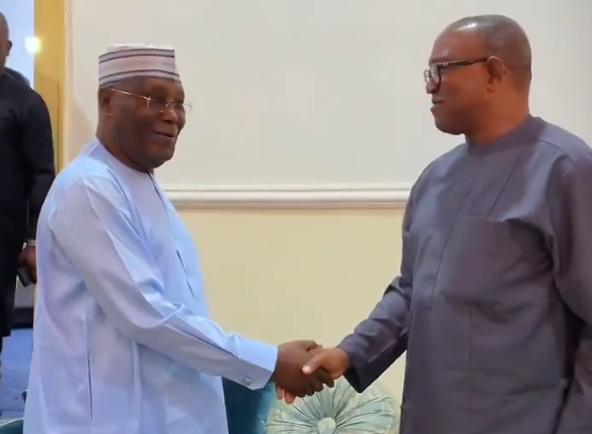Paragraph 1: The Genesis of a Potential Alliance
Whispers within political circles suggest a potential reunion on the 2027 presidential ticket: former Vice President Atiku Abubakar and Labour Party’s 2023 candidate, Peter Obi. Sources close to the ongoing coalition talks reveal that Atiku proposed a joint ticket with Obi during a meeting in the United Kingdom earlier this year. This proposition entails Atiku heading the ticket with Obi as his running mate, with a commitment from Atiku to serve only a single four-year term, paving the way for Obi to potentially lead the nation afterward. This arrangement echoes their previous partnership during the 2019 elections under the Peoples Democratic Party (PDP) banner, where they lost to incumbent Muhammadu Buhari.
Paragraph 2: Navigating Internal Party Dynamics & Seeking Loyalists’ Support
Despite the potential for a powerful alliance, both Atiku and Obi face considerable hurdles within their respective parties. The PDP and Labour Party are grappling with internal crises, impacting their stability and direction. Obi is actively working to secure the support of his core followers, crucial for the success of any joint venture. This internal lobbying underscores the importance of party loyalty and the need to manage expectations and potential dissent within their bases. The proposed single-term agreement appears strategic, designed to appease both sides and offer a clear path to power for both individuals, potentially mitigating internal resistance.
Paragraph 3: Exploring Alternative Political Platforms
The ongoing turmoil within the PDP and Labour Party has prompted Atiku and Obi to explore alternative political platforms for their potential joint ticket. The African Democratic Congress (ADC) has emerged as a frontrunner, with discussions reportedly underway between the two leaders’ loyalists and the ADC leadership. The Social Democratic Party was initially considered but concerns about infiltration by the ruling All Progressives Congress (APC) seem to have shifted the focus. This exploration highlights the fragility of existing party structures and the willingness to adapt to the fluid political landscape in pursuit of power.
Paragraph 4: Official Responses and Public Posturing
Public statements from the key players and their representatives remain carefully measured. Atiku’s media aide, Paul Ibe, confirmed ongoing coalition talks but refrained from commenting on the specifics of any agreement. Similarly, a close associate of Obi, Peter Ahmeh, declined to comment on the single-term agreement, emphasizing Obi’s ongoing efforts to resolve the internal crisis within the Labour Party. This cautious approach suggests a desire to avoid premature announcements and maintain flexibility as negotiations progress. Meanwhile, the ADC National Chairman, Ralph Nwosu, acknowledged conversations with various stakeholders, including those from the APC, but stopped short of confirming specific discussions with Atiku and Obi.
Paragraph 5: Skepticism, Opposition, and Historical Parallels
The proposed alliance is not without its detractors. Diran Odeyemi, a PDP National Executive Committee member, expressed skepticism about Atiku’s prospects, urging him to abandon his ambition. Odeyemi questions Atiku’s ability to secure the PDP ticket in 2027 and casts doubt on the validity of offering a position he may not control. This opposition highlights the internal divisions within the PDP and the challenges Atiku faces in regaining control of the party machinery. However, Anthony Sani of the Arewa Consultative Forum sees the potential alliance as a logical progression, given their past partnership. He acknowledges the significant political realignment taking place, particularly the alliance between the North-West and South-West, and the APC’s inroads in the South-South, emphasizing the dynamic nature of the political landscape.
Paragraph 6: Uncertain Future and Political Calculations
The feasibility of an Atiku-Obi ticket remains uncertain. The internal party crises, the need to secure the support of their respective bases, and the potential shift to a new political platform present significant challenges. The proposed single-term agreement, while strategically designed, may not be enough to overcome these hurdles. The broader political context, including the shifting alliances and the APC’s growing influence, further complicates the situation. Ultimately, the success of any such alliance will hinge on their ability to navigate these complexities and convince the electorate of their shared vision for Nigeria. The months ahead will be crucial in determining whether this potential partnership can materialize and offer a credible challenge to the ruling APC in the 2027 elections.














